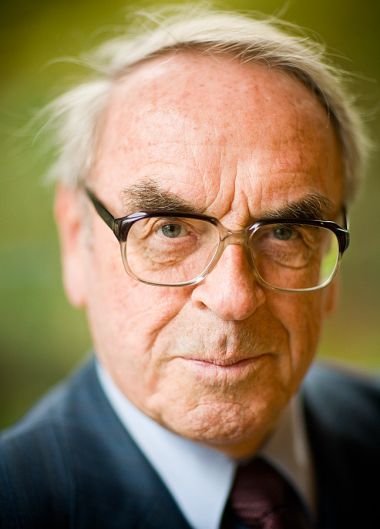Liberation and hope: 10 of the best Jürgen Moltmann quotes

One of the world's most prominent theologians is 90 today. Jürgen Moltmann is a German reformed thinker, author of numerous books and one of the most significant theologians of the age. He began life in an atheist family and entered the German Army.
When, at the end of World War Two, he surrendered, he became a prisoner of war. Wracked by doubts and sorrow over Nazi atrocities, he was despondent. Yet his life was about to change. Given a copy of the New Testament by a chaplain while he was being held in the UK, Moltmann described the process as being found by Christ. "Jesus found me when I was 18 years old," he said. "The testimony of other believers and reading of the Scriptures – especially the Psalms and Mark's Gospel – made a lasting impact on me and forever changed my life."
His theology has focused on liberation and hope. It isn't without controversy – he is an advocate for a kind of universalism. But along with his inspiration Karl Barth, he remains a giant of 20th (and 21st) Century theology.
Here we look at 10 of his most inspiring and thought-provoking quotes.
1. "The raising of Christ is not merely a consolation to him in a life that is full of distress and doomed to die, but it is also God's contradiction of suffering and death, of humiliation and offence, and of the wickedness of evil." (Theology of Hope)
2. "God does not become a religion, so that man participates in him by corresponding religious thoughts and feelings. God does not become a law, so that man participates in him through obedience to a law. God does not become an ideal, so that man achieves community with him through constant striving. He humbles himself and takes upon himself the eternal death of the godless and the godforsaken, so that all the godless and the godforsaken can experience communion with him." (The Crucified God)
3. "In the raising and exaltation of Christ, God has chosen the one whom the moral and political powers of this world rejected – the poor, humiliated, suffering and forsaken Christ. God identified himself with him and made him Lord of the new world... The God who creates justice for those who suffer violence, the God who exalts the humiliated and executed Christ – that is the God of hope for the new world of righteousness and justice and peace." (Ethics of Hope)
4. "The messianic hope was never the hope of the victors and the rulers. It was always the hope of the defeated and the ground down. The hope of the poor is nothing other than the messianic hope." (The Way Of Jesus Christ)
5. "With Christ in faith a wholly new life begins. It is not a restored life, and it is not a rejuvenated life either. It is not even a life reborn out of its origin. The resurrection of Christ has no historical prototype. It is something completely new in history. It is the beginning of the new creation of everything." (The Source Of Life)
6. "The cross is not something historically fortuitous which might not have happened. God himself is nothing other than love. Consequently Golgotha is the inescapable revelation of his nature in a world of evil and suffering." (The Trinity and the Kingdom)
7. "We experience what life and death really are when we love, for in love we go out of ourselves, become capable of happiness and at the same time can be hurt." (Sun of Righteousness, Arise! God's Future for Humanity and the Earth)
8. "When all hopes have died, there comes the wave of the future like a spirit of resurrection into the dead bones (Ezekiel 37), creating hope against hope." (Religion, Revolution, and the Future)
9. "Totally without hope one cannot live. To live without hope is to cease to live. Hell is hopelessness. It is no accident that above the entrance to Dante's hell is the inscription: 'Leave behind all hope, you who enter here.'" (Theology Of Hope)
10. "The God of freedom, the true God, is... not recognised by his power and glory in the history of the world, but through his helplessness and his death on the scandal of the cross of Jesus." (The Crucified God)











